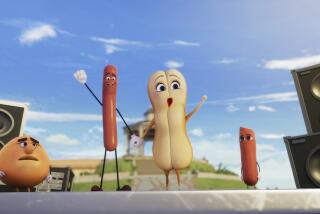Swallowing indignities in a sallow world
- Share via
Anyone who has read Eric Schlosser’s book “Fast Food Nation” can tell you that the big burger-related question of the day is not “where’s the beef,” but what, in the name of all that is good and pure, is in the beef. Apparently, not much that is good and pure. Beyond that, you don’t want to know -- and neither does the $330-billion fast food industry, which in response to Schlosser’s Upton-Sinclair-of-the-Happy-Meal expose, launched a major PR counteroffensive designed by the same people who brought us the Swift Boat campaign. (McDonald’s has denied involvement.)
According to an industry website that’s probably just coincidentally called “Best Food Nation,” there’s no basis to critics’ claims that fast food companies knowingly hire illegal workers, that cattle farming harms the environment, that fast food restaurant jobs lead nowhere, that dangerous meat-processing jobs are given to untrained workers and that beef patties and cow patties sometimes contain a surprise ingredient in common.
These, of course, are the major plot points of Richard Linklater’s fictionalized adaptation of the book, which not surprisingly refrains from naming names, especially litigious ones. Instead, “Fast Food Nation” invents a global burger mill with a friendly corporate identity and a little bit of a PR problem. An activist group has smuggled a frozen patty out of a secured location and had it tested in a lab. The beef contained high levels of fecal coliform -- or, as Mickey’s chief executive explains to his new marketing manager, Don Anderson (Greg Kinnear), who recently hit a home run with the launch of “The Big One,” “There’s ... in the meat.”
So, Don is dispatched to Cody, Colo., to see what he can find out about the Uniglobe Meat Packing plant. Weaving together three main narrative strands to create a sprawling, ambitious overview of a world colonized by corporations, Linklater introduces us to recent illegal immigrants Raul (a surprisingly sensitive Wilmer Valderrama) and his sister-in-law Coco (Ana Claudia Talancon), who have just gotten jobs at the plant; Raul’s wife, Sylvia (Catalina Sandino Moreno), who has opted for lower-paying but less brutal work as a hotel maid; and Amber (Ashley Johnson), a bright high school student who works at one of the many Mickey’s franchises in town.
At first, Don is impressed with the “official” (read: embedded) sanitized tour of the plant, until he hears one too many offhand remarks about unsafe working conditions and poor hygiene, convincing him to dig deeper. Tony (Esai Morales), the owner of the Mickey’s franchise where Amber works, refers him to an old cattle rancher named Rudy Martin (Kris Kristofferson). Part two of Don’s education comes with a tour of Rudy’s ranch, where he sees burned-out illegal meth labs and cracker boxes built by real estate speculators encroaching on the land. Part three comes courtesy of Harry Rydell (Bruce Willis), an inspector who acts as a liaison between Mickey’s and Uniglobe, who dismisses Rudy’s point of view as the perspective of “fraidy-cats.”
For Linklater, the term “Fast Food Nation” applies to more than just burger and taco chains. It represents a gradual, complicit shift from reality to permanent reality displacement. In “Fast Food Nation,” small-town/rural landscapes are transformed into chain-store dystopias. Workers are made to wear uniforms and name tags and robotically parrot corporate scripts when talking to customers. Drugs help people get through the mechanical actions.
Ironically, all of this artificiality is rooted in a reality that’s almost too much to bear. It doesn’t get more visceral than the meat plant -- especially at the gut table, where the problem Don’s been sent to investigate is spilling out faster than the unskilled workers can contain it. The movie itself seems to move at the slow, rather bovine pace that Linklater favors. At times it’s as though the movie was headed to slaughter, to the hidden part of the plant where cows are guillotined and blood forms rapids.
If Linklater regards the fake culture that has replaced real places with horror, he has nothing but respect and affection for his characters, and the movie is rescued from nihilism by his humanistic view. Linklater defines his characters by their relationships, hopes, choices and weaknesses -- not, as so many directors do, by their particular socioeconomic circumstances.
From the illegal workers to the executives whose success requires serious moral compartmentalization, to every fry cook, cashier, hotel concierge, chain-restaurant waitress and client in the film, every character exists within an increasingly homogenous, inorganic system, and each individual must find a way to live within it on his or her own.
Don may be the most morally compromised of all the major characters, and though he soon drops out of the story, Kinnear makes him one of the most complex and interesting. No other actor I can think of is better equipped to channel the ignominious pain of the midlevel, white-collar hustler than Kinnear -- a genius at reconstructing his company-man expression after each time his face crumples in fear and loathing. The guy is Willy Loman in Dockers.
Linklater makes these points skillfully, and with a light touch, without resorting to bombast, melodrama or false polemic. The situation he describes is nobody’s plight, but it is everyone’s seemingly unsolvable problem.
As Rudy tells Don, “This isn’t about good people versus bad people. This is about the machine that’s taken over the country.” Rudy’s observation makes an impression, but when Harry advises Don to look the other way, saying “It’s a sad fact of life, Don, but the truth is we all have to eat a little ... every now and then,” you know he has long ago taken that message to heart.
MPAA rating: R for disturbing images, strong sexuality, language and drug content. Running time: 1 hour, 46 minutes. In general release.
More to Read
Eat your way across L.A.
Get our weekly Tasting Notes newsletter for reviews, news and more.
You may occasionally receive promotional content from the Los Angeles Times.










